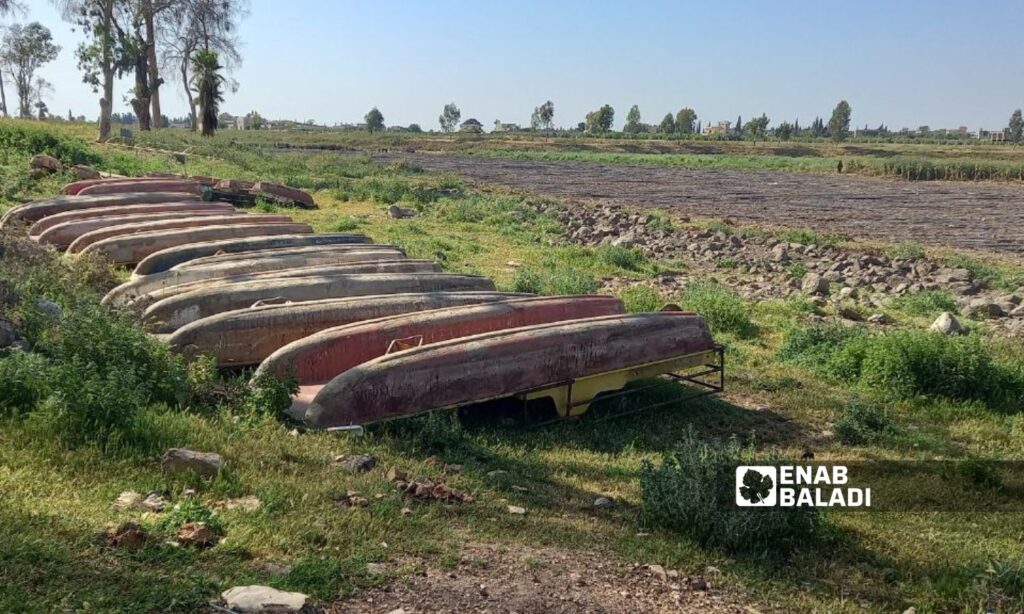Daraa – Halim Muhammad
Once bustling in summer with tourists sailing boats in its fresh waters, Lake Muzayrib in western Daraa countryside has turned into dry land planted with tomatoes and cucumbers, preceded by wheat.
Some residents neighboring the lake cultivated its land, justifying that it was barren land no longer fed by water. This encroachment on the lake included the western section of its surroundings, planted with eucalyptus trees, and now sown with barley crops, depriving residents of the enjoyment of sitting under the shade of the trees. A large number of trees were also chopped down.
Moatasem al-Zaraq, a media activist residing in the town, told Enab Baladi that the neighboring residents planted the lake bed with wheat and barley last winter after the lake dried up.
After wheat and barley, the lake’s land was planted with fava beans and peas a few months ago, and is currently planted with summer crops like cucumbers and tomatoes.
Farmers draw water for irrigation from private wells that were dug within the lake’s aquatic domain, according to the activist, who added that the lake’s neighbors wanted to plant it with olive trees, but a number of town residents protested and prevented them fearing land appropriation.
There is no official or local authority overseeing the lake’s land and its surrounding perennial trees.
The lake is located west of the town of Muzayrib and is one of the most important tourist sites in the province, covering an area of about two kilometers, 500 meters in length and 250 meters in width.
The lake was a source of income for fishermen, shop owners, and street vendors operating therein, as well as children’s amusement facilities and boats that used to cruise its waters with tourists.
On the ruins of old memories
Ghassan (33 years old) from the city of Daraa stood among the boats thrown on the lake’s edge, with fields that have become farmland before his eyes, regretting the state that Lake Muzayrib had reached.
He said that he used to make beautiful memories with his family by the lake, adding that they would spend a full day under the shade of the trees, swimming and boating.
Ahmad (30 years old) from Muzayrib town said it would be more appropriate to plant the lake’s land with forest trees and make it a protected tourist area under the stewardship of the active entities in the town.
Temporary drought
Moatasem al-Zaraq said that the lake had started to experience dryness during the summer four years ago, returning in winter, but had been permanently dry for the past two years.
Abdel Karim (55 years old), a former employee of the water resources, told Enab Baladi that random drilling in the aquatic domain of Lake Muzayrib altered its watercourses. The water channels feeding the lake are shallow, not exceeding 50 meters deep, while some wells were dug deeper than 200 meters, changing the course of the water-bearing strata.
During the winter of 2023, the hot springs in al-Fuwar town, al-Abd springs in al-Ajami, and Zayzoun Lake returned, but the danger lies in the continued deep drilling that changes the feeding routes of these springs, according to Abdel Karim.
Lake Muzayrib was a primary source for supplying the province of As-Suwayda with drinking water, as it provided about 18% of the province’s needs, according to a statement by engineer Wael al-Shariti, director of As-Suwayda Water Institution, last February.

